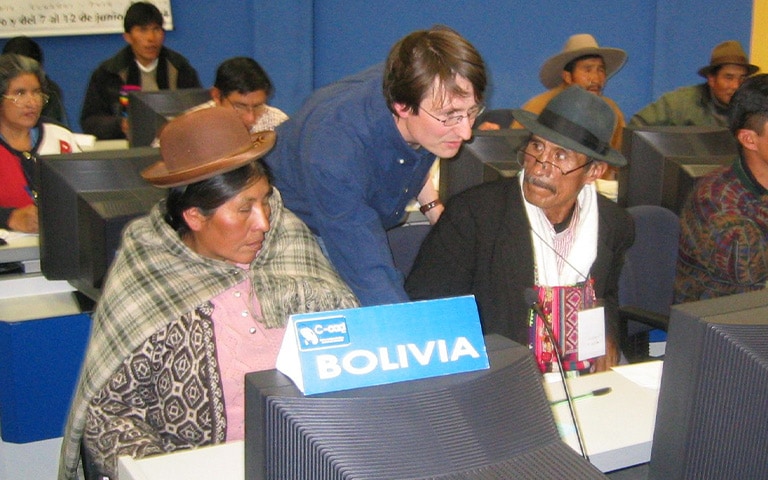This site uses cookies. By continuing to browse the site you are agreeing to our use of cookies. Read our privacy policy

Eleni Laitsou and Apostolos Xenakis take a scholarly look at digital development and its impact on human well-being.
 |
Dr. Eleni Laitsou is a member of the Teaching and Research Staff at the University of Thessaly in Greece. She focuses on economic impact of digital technology. |
 |
Dr. Apostolos Xenakis is an Assistant Professor in the Department of Digital Systems at the University of Thessaly in Greece. |
We often assume that digitization’s impact on our lives is mainly positive, speeding up and easing nearly everything from work to entertainment to education and health.
But is this really true? As academics, we believe it is important to investigate whether countries with high levels of digitization also exhibit a high quality of life for their citizens.
In pursuit of these answers, the University of Thessaly, in particular its Department of Digital Systems, conducted a research study whose main focus was to explore the relationship between digitization and quality of life.
Using data from two key digital indicators—the EU’s Digital Economy and Society Index (DESI) and the UN Human Development Index (HDI)—the study centered on EU countries during the period from 2018 to 2021. The impact of Covid-19 on these indicators was also examined.
The HDI, developed by Pakistani economist and politician, Dr. Mahbub ul Haq and used by the United Nations Development Program, serves as a comprehensive measure of a country's development. It encapsulates achievements in three crucial dimensions of human development: a long and healthy life, access to knowledge, and a decent standard of living.
In parallel, DESI emerges as a composite index designed to rank EU member states based on digital performance and track the evolution of their digital competitiveness. With a three-level structure, DESI encompasses four pivotal policy areas:
The primary conclusion drawn from this research is that there exists a significant and positive relationship between the two indicators, DESI and HDI. This implies that, as the adoption and utilization of digital technologies increase, quality of life also improves.
Furthermore, it is observed that human capital and the integration of digital technology significantly affect HDI. This highlights the importance of offering training and specialized skills in the field of information and communication technology (ICT), along with emphasizing the significance of private sector investments in digital transformation initiatives.
Moreover, the impact of the Covid-19 pandemic on these indicators has been examined. It has been demonstrated that the pandemic period had a significant and positive effect on the integration of digital technologies. However, it had a negative impact on the quality-of-life index for individuals. This implies that, while digitalization has advanced during the pandemic and positively affected the quality-of-life index, the overall well-being of individuals has been adversely affected.
Additionally, the classification of countries based on HDI and DESI indicators reveals the existence of four distinct categories. A significant number of countries fall into either one of two categories: those that are consistently above the mean in both indicators, and those that are consistently below the mean. This finding reinforces the notion that there is a strong connection between these indicators, indicating that they mutually influence each other. Germany stands as an exception to this pattern, boasting a high HDI value but a DESI value below the mean.
In contrast, Denmark, Sweden, the Netherlands, and Finland consistently maintain high values in both indices, showcasing a harmonious balance between human development and digital progress. On the contrary, Romania and Bulgaria consistently exhibit low values in both indicators, indicating areas for potential improvement.
Additionally, countries like Cyprus, Italy, and the Czech Republic hover around average HDI values but lag behind in DESI, with Greece displaying a similar trend and a slight deviation in HDI. Noteworthy changes occurred during the study period, including Latvia, Lithuania, and Portugal experiencing a decline in DESI values below the mean in 2021 after transitioning from a different category. Belgium showed a deterioration, with a DESI value slightly below the mean in 2021 compared to its position in 2018. Slovenia's DESI value dropped below average in 2020 but rebounded in 2021, illustrating dynamic fluctuations in digital development.
These findings illuminate the significance of digital advancement in influencing the quality of life, underscoring the necessity for concentrated initiatives to improve human capital and digital transformation, with a special focus on private sector involvement. Policymakers and stakeholders can use these insights to craft specific strategies aimed at fostering both digital competitiveness and the overall well-being of individuals and societies.





















Contact us! transform@huawei.com
